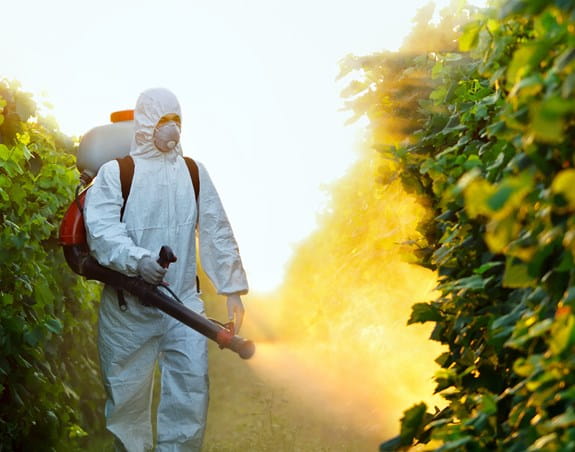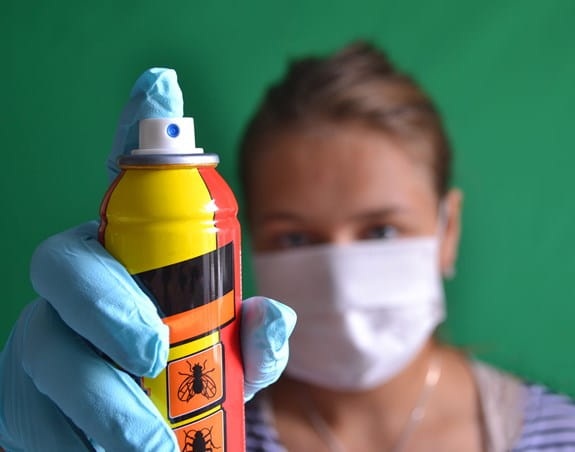Pesticides

What are pesticides?
Pesticides are chemicals used to kill or control insects, plants, animals or other pests.
Pesticides are often used because pests can affect our health, safety or food supply. This use of pesticides is called non-cosmetic because it’s needed for public health and safety.
Pesticides are also used to make lawns, gardens and other green spaces look better. We call this use cosmetic because it’s not needed for health and safety.

Pesticides are a group of chemicals that include:
- insecticides – for insect control
- herbicides – for weed control
- fungicides – for control of disease caused by fungus
- rodenticides – for rodent control
- fumigants – a gas or vapour used to control insects
Pesticides and cancer
Much of the evidence on the health risk of pesticides comes from studies that look at cancer risk in people who use pesticides in their work – for example, farmers, golf course workers and pesticide manufacturers. The research shows that pesticide exposure in general (as well as exposure to specific pesticides) is linked to several types of cancer such as non-Hodgkin lymphoma, multiple myeloma, and prostate, kidney and lung cancers, among others.
The International Agency for Research on Cancer (IARC), classifies a small number of pesticides as known carcinogens and a few others as possible carcinogens. Many of these pesticides are no longer used in Canada.
Cosmetic use of pesticides
Pesticides use should be phased out at golf courses and sports facilities, especially where children often are, or if they are located next to residential and public areas.
Pesticides should be used as the last option, in the smallest possible amount and only where needed to make a place usable. People should stay away from treated areas for at least 48 hours after the last amount of pesticide is applied.
The use of pesticides in home or personal vegetable and fruit gardens should also be phased out. Although the pesticides you use at home may be milder than those used for agriculture and you may use them less often, there is still risk.
In the agriculture industry, there are usually more rules in place to reduce exposure, such as training for people who apply pesticides to properly use equipment that protects them, plans to reduce residue levels and pesticide drift and rules to limit access to sprayed areas.

Non-cosmetic use of pesticides
The risks and benefits of the non-cosmetic use of pesticides should be considered for each situation. Where pesticides are necessary to protect our food supply or to prevent the spread of disease, we recommend that:
- The choice of chemicals should take into account their potential long-term health effects, like the risk of developing cancer in later years.
- Widespread chemical spraying should be used only as a last option to protect human health and safety.
- If chemical spraying is needed, people must be warned about the risks and helped to protect vulnerable family members such as infants, elderly people and people with weak immune systems.
- Guidelines that are based on evidence should be set up to help people decide which chemical treatments to use.

12 ways to protect you and your community from pesticides at work
Read the product information about pesticides and follow the directions on the label.
Follow work health and safety requirements. For example, make sure that you have received any necessary training and certification before selling or applying pesticides.
Wear protective equipment (gloves, masks and goggles) as recommended on the pesticide label.
Wash your hands immediately after using pesticides.
Get rid of empty pesticide containers by following the instructions on the label. Contact the city or town office in your area about getting rid of unused pesticides.
Reduce drift and environmental contamination. For example, add a buffer zone – leave a strip of land without pesticides next to a sprayed area. Spray pesticides on days with no wind when the temperature is below 25°C.
Post signs warning people that an area has been treated with pesticides.
Don’t wear clothing at home that was used while working with pesticides. Clothing worn at work should be washed after each use and separately from other clothes.
Don’t smoke, drink or eat when handling pesticides.
Don’t rub your eyes or touch your mouth while working with or after using pesticides.
Don’t store pesticides near food or drinks.
Don’t move pesticides into a different container for storing – if you do, you or someone else might misuse them by mistake. Also, always keep the original label with safety instructions on the container.
